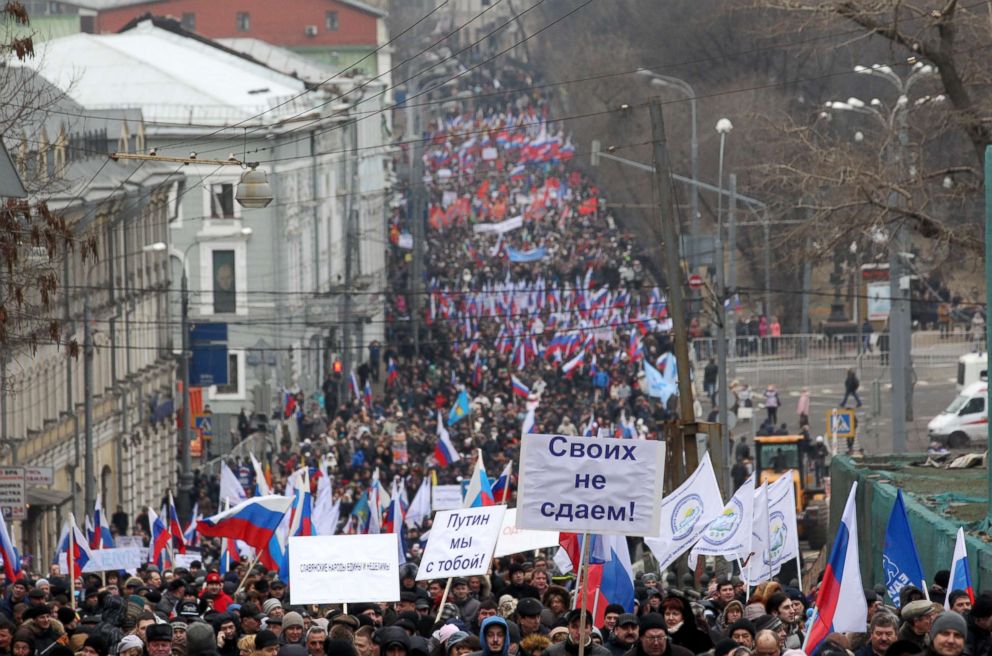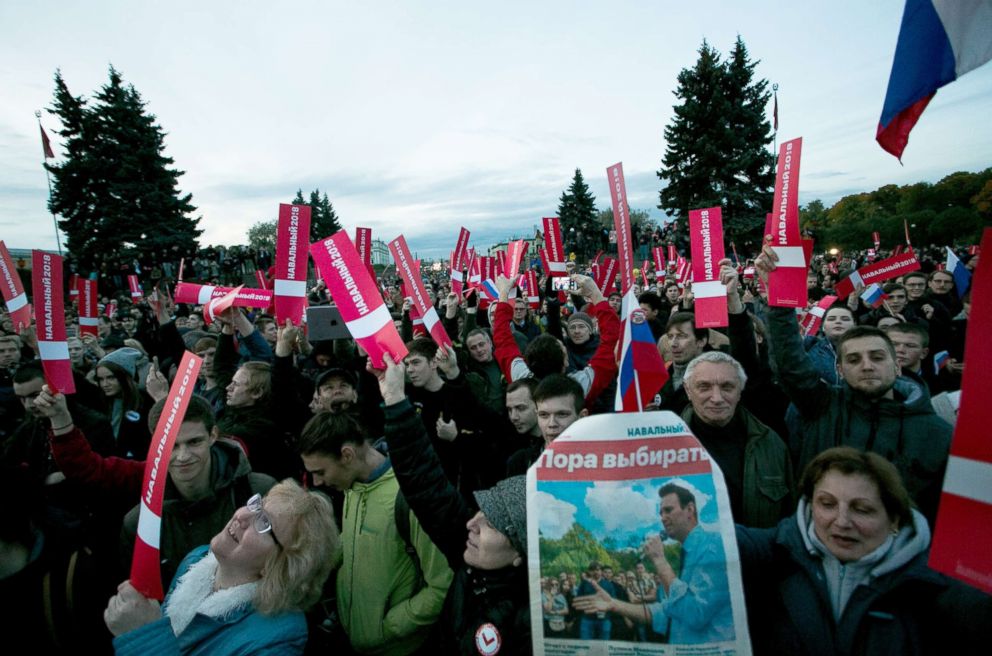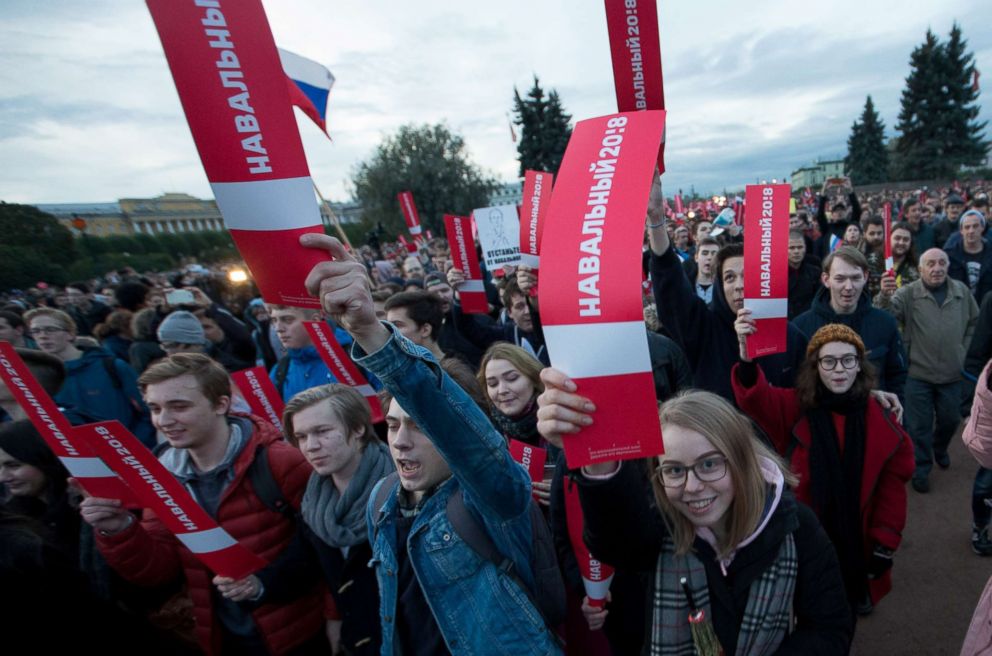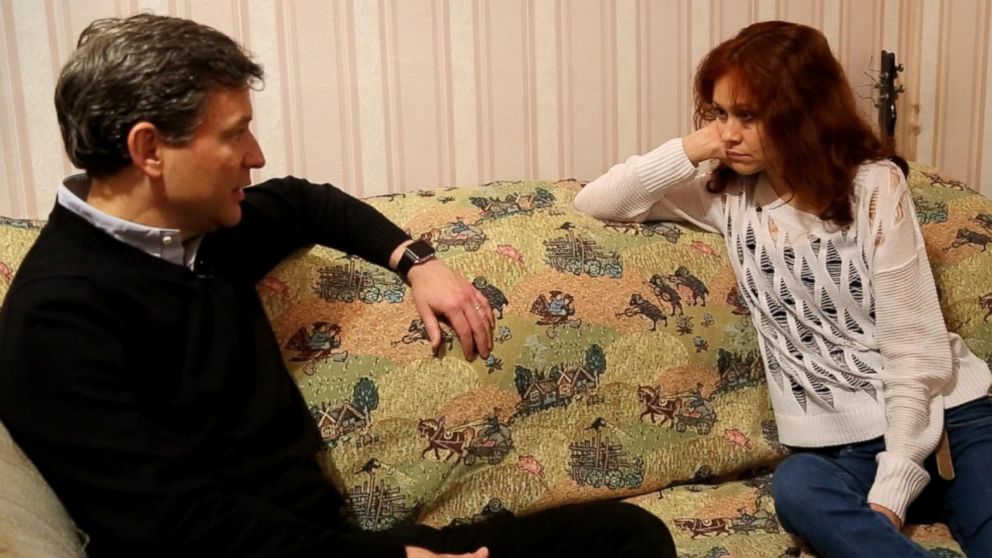Spending 10 days inside Putin's Russia
"Nightline" spent 10 days talking with Russian citizens about their lives there.
— -- In Russia, President Vladimir Putin is power personified – power that he has projected all over the world.
But beyond the role Russia continues to have in the U.S. 2016 election aftermath, the Olympics doping controversy and the Ukraine invasion, “Nightline” took a look at the view from inside Putin’s country as he prepares to run for a new term in March.
“Nightline” spent 10 days traveling across Russia meeting a wide variety of citizens, from anti-Putin protestors to a leader of a pro-Putin paramilitary group to self-described former internet trolls, to learn about Putin’s country through their eyes.
The president rose from being a mid-level spy during the Cold War to Russia’s unquestioned ruler for 17 years. He’s even been called the "new tsar." He has an 85 percent approval rating, and is known to handle critics with a mixture of brute force and outright humiliation.
To be against Putin in today’s Russia is to cut radically against the grain.
One of those people is opposition leader Alexei Navalny. He has been called “the man Vladimir Putin fears most,” and he leads anti-Putin rallies across the country. He has been publically beaten and was nearly blinded when a green substance was sprayed in his face.
Navalny had been planning a protest in Putin’s hometown of St. Petersburg on the president's birthday, but then he was sentenced to 20 days in jail for calling an unsanctioned rally.
“I guess this is my present for Putin’s birthday,” he told "Nightline" in Russian on the day of his sentencing.
But he defiantly announced on Facebook that the protest would proceed anyway and called on his supporters to go forward with the rally in St. Petersburg and across the country. The Russian government crackdown quickly began.
Overnight, government forces carried out raids on the offices of opposition organizations. A video of an opposition leader, shown face down on the floor with a heavily armed police officer restraining him, was recorded by state-run media and posted online.
One of the opposition activists named Tonya works for a group called “Open Russia,” whose offices were raided. She showed "Nightline" where armed guards had kicked in the office door and were searching the space.
“I’m very stressed,” she said. “I’m here because I really love my country and I think we have to do something it’s not possible to live under this pressure anymore… The country is in danger.”
When the national day of protest arrived on Putin’s birthday, Oct. 7, it began with a show of force from one of Putin’s most unusual allies – an ultra-nationalist, anti-Western, anti-gay and allegedly violent biker gang called the Night Wolves.
The group is led by a man known as “the surgeon.” Aleksander Zaldostanov, a former dental surgeon, is a personal friend of the Russian president and celebrity in his own right.
When asked how he came to develop such a strong relationship with Putin, Zaldostanov said in Russian, “Because he is special. Because he’s much smarter than other government bureaucrats..”
Zaldostanov denied that the group was funding as part of a government propaganda effort.
“Propaganda is when you are paid to do work,” he said. “I am not paid to do this.”
Despite his denials, a public record shows the biker gang has received funding from the Kremlin.
Zaldostanov’s group isn’t just for show. The group was allegedly part of the invasion of Ukraine’s Crimean Peninsula and afterwards they participated in a victory rally in Moscow. In March 2014, Putin signed a law formally incorporating Crimea into Russia, completing the takeover of the peninsula.

The U.S. government sanctioned the group over accusations its members committed acts of violence in Ukraine, but when asked if there was any truth to those accusations, Zaldostanov said, “I think they are annoyed just because we are messing up their plans.”
In response to Navalny’s protestors coming out to St. Petersburg, Zaldostanov said, “Let them watch our bikes, let them watch our shows, maybe something will change in their brains.”
Stylistically, the opposition protestors could not be more different from Zaldostanov’s group.
Alexander, a 23-year-old graduate student, represents the typical Navalny supporter: Liberal, educated and young. Many of them were galvanized by Navalny’s massively popular YouTube channel, which hosts videos that document the alleged corruption of Putin and his inner circle.
When asked if going to Navalny’s protest was a risky thing to do, Alexander said, “Yeah, of course. It’s Russia.”
As Alexander got closer to the group of young Russians getting ready to protest in St. Petersburg, he could see the large police presence there – and the police had promised to act harshly to break up the rally.
“I think there’s two options,” he said. “You get arrested or not -- if you’re fast enough.”

As the rally got underway, dozens of protestors carried signs and chanted things like “Putin -- thief!” as they marched through the streets of St. Petersburg. Then riot police moved surrounded the protestors, telling them that this was an unauthorized march and they needed to leave immediately. When the police weren’t wading into the crowd, they appeared to be sending in provocateurs to start up fights. Curses were exchanged. Eventually, a fight did break out. Police moved in fast and dragged those involved away.
As the protest winded down, Alexander said he believed their presence did have an impact.
“It’s a little step that we can make all together,” he said. “Only all together.”

Aside from government forces cracking on protests, another way Putin allegedly abuses his power is through controlling the media and they are accusations that Russian trolls are working to spread the Kremlin’s message online.
Even though the 2016 U.S. election has ended, U.S. lawmakers say, these trolls are still pumping out social-media posts on divisive issues such as the NFL kneeling controversy and the deadly car-ramming in Charlottesville, Virginia.
On the outskirts of St. Petersburg, there is an unassuming office building, which people who claimed to have worked there say is home to a “troll factory,” where Internet trolls work to exploit the U.S.’s deepest divisions.
An undercover video that former trolls say they shot in 2015 appears to show tight security and rows of trolls typing away.
Lyudmila Savchuk, a journalist, told ABC News she had gone undercover to work in the troll factory for about $700 a month. She said that as part of her job, she'd invent fictional characters and then post under their names with topics carefully selected by her bosses, and the U.S. was always at the top of the list.
“[These characters] were carefully crafted to transmit the Kremlin’s thoughts to the public,” Savchuk said.
Other former trolls described being told to target American audiences by adopting multiple online personalities, like a white person from Kentucky or an African-American from an New York City.
For speaking out, Savchuk said she and her family have faced threats, but she said she remains dedicated to her mission to shut the troll factory down.
“It created an atmosphere of animosity towards Americans,” Savchuk said. “It is murder through words.”

But far from the grandeur of St. Petersburg, one of the darkest manifestations of Putin’s presidency is playing out in the remote villages of Siberia, home to some of Russia’s poorest people.
The city of Ekaterinburg is home to the grim reality of perhaps the worst AIDS crisis in the developed world. There, people lined up in a dark parking lot in a rough neighborhood to enter a clinic, where they could take a test to determine whether they were HIV positive.
One mother had her children by her side as she was tested. One man, like many of the people there, said he was a drug addict – heroin has helped fueled the AIDS epidemic through needle sharing. Within 15 minutes, they both learned they were HIV positive.
The intertwining epidemics of drugs and AIDS are expanding because critics say Putin, who has wrapped himself in the aura of the conservative orthodox church, has actively resisted addressing these issues. Experts say more than one million people in Russia are now infected with HIV -- about the same as the U.S., but its population is more than twice the size of Russia’s.
Some people have criticized the Russia government for making the epidemic worse by not being willing to talk about what causes the spread of HIV nor having sex education in schools.
Another mother who was at the clinic said she was HIV position and didn’t know whether her young son, Daniel, also had the virus.
“Not enough information, not enough,” she said. “When I got sick, I knew nothing about it. They didn’t tell me in school. I never came across this information.”
Another boy, who said he was 17 years old and HIV positive, said he only recently began to understand his diagnosis because sex education is almost non-existent.
This Ekaterinburg HIV center is run by a woman named Marina. She said the center is a rare haven for those with HIV to escape rampant discrimination. She spread out the center’s AIDS quilt and said it showed only “part of” the number of people who had come through the center, “because we don’t have time to finish,” she said.
“Many of our clients died, and it’s very frustrating,” she said.
She claims the Kremlin classified her and other like her as foreign agents, or in other words, as spies, which she thought had to do with, in part, the fact that she accepts funding from foreign countries like the U.S.
Marina said the Russian government has damaged efforts to address this crisis, rejecting needle exchanges and free condoms as "Western practices." Just recently, Russia finally started running a large-scale anti-AIDS campaign, but it focuses on prevention through monogamy. Meanwhile, she said, people continue to die.




